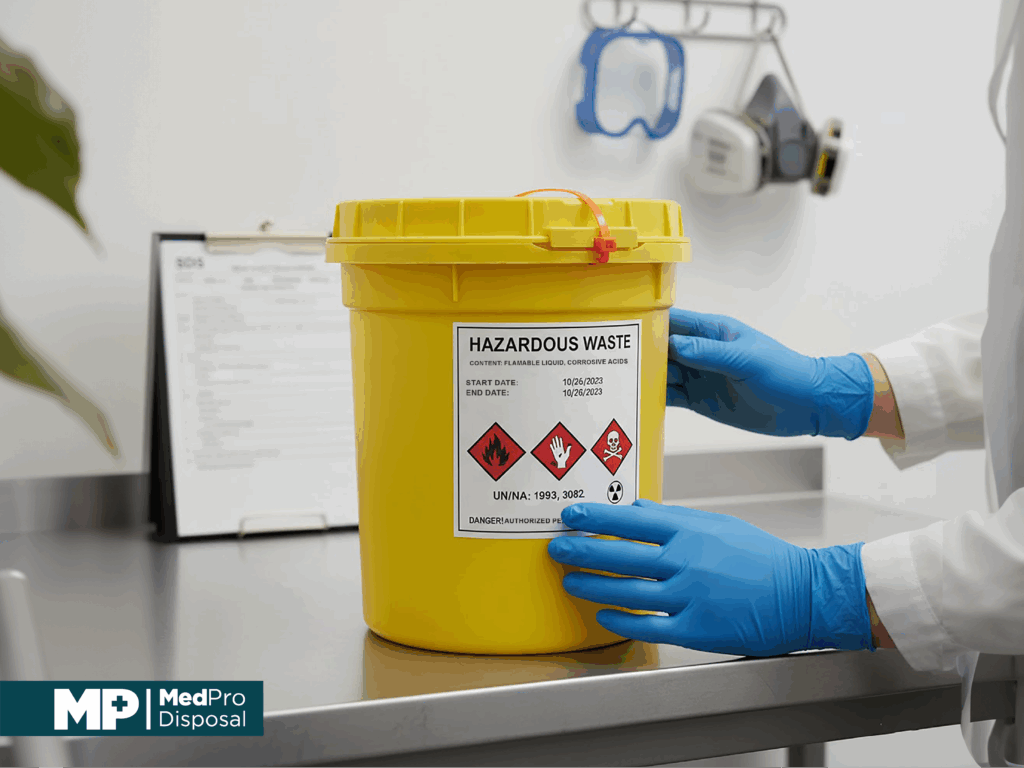Every day, healthcare facilities, laboratories, and pharmacies handle hazardous waste. This waste can range from expired medications to used chemical reagents and requires proper hazardous waste disposal.
If mismanaged, hazardous waste disposal can become a harmful risk. It is a potential risk to human health and the environment. That’s why knowing how to dispose of hazardous waste matters.
What Is Hazardous Waste Disposal?
The Environmental Protection Agency (EPA) defines hazardous waste disposal services succinctly. The EPA explains that it is the safe management and final treatment of hazardous waste.
Common examples of hazardous waste include:
- Chemical solvents and degreasers.
- Pharmaceutical compounds and lab reagents.
- Mercury-containing devices such as thermometers or lamps.
- Battery acids, paints, and cleaning agents.
The EPA’s Resource Conservation and Recovery Act (RCRA) oversees proper hazardous waste disposal. RCRA requires facilities to track hazardous waste from generation to final disposal. The EPA calls this the cradle-to-grave tracking system. It monitors hazardous waste from generation to final disposal.
The Main Categories of Hazardous Waste
The EPA identifies four major categories of hazardous waste and defines these types of waste based on their characteristics:
- Ignitability – wastes that burn readily, such as alcohol-based cleaners, fuel-based liquids, and most solvents.
- Corrosiveness – wastes with acids or base chemicals that can corrode metal or damage living human tissue.
- Reactiveness – wastes mixed with or composed of unstable chemicals that explode or emit toxic gases.
- Toxicity – wastes like pesticides or those with heavy metals. These can cause harm when accidentally ingested or absorbed through the skin.
The EPA also classifies hazardous waste under the F, K, P, and U lists. Additionally, the mixed wastes category contains both radioactive and hazardous materials.
Why Proper Hazardous Waste Disposal Matters
Hazardous waste is a huge environmental risk. Without proper hazardous waste management, it can contaminate the soil and groundwater. It can result in long-term ecological harm and workplace exposure risks.
Who Regulates Hazardous Waste Disposal in the U.S.?
Federal and state agencies take hazardous waste disposal compliance seriously. They enforce hazardous waste regulations, and violations can result in daily fines or even forced shutdowns.
The EPA and the DOT are the primary agencies that oversee these regulations. They work with other agencies to ensure safe and compliant hazardous waste management.
- EPA: Oversees generation, transportation, treatment, and disposal under RCRA.
- DOT and PHMSA: Regulates packaging, labeling, and transportation safety.
- OSHA: Protects workers through training and safety programs. One such program is the Hazardous Waste Operations and Emergency Response (HAZWOPER).
- State environmental agencies: Enforce local rules, issue permits, and manage compliance reporting.
Together, these agencies uphold the cradle-to-grave accountability system. This ensures every step of hazardous waste disposal is traceable and compliant.
How to Dispose of Hazardous Waste Safely and Efficiently
Hazardous waste disposal is a rigid and strict process. You can follow this general guide and customize it according to your facility’s size and waste volume.
- Identify and classify your waste.
Use Safety Data Sheets (SDS) to determine whether your waste materials meet EPA definitions.
- Segregate and label your hazardous waste containers.
Never mix incompatible waste types. Segregate and label your hazardous and non-hazardous waste containers in the format below. These labels help with compliance, workplace safety, and traceability.
- Waste name and description
- Accumulation start date
- Generator name and address (Office, laboratory, etc.)
- Hazard class (corrosive, flammable, reactive, toxic)
- Apply hazardous waste management to your containment and storage.
Use approved containers with secondary containment and proper ventilation.
- Preparation for transport.
Ensure your hazardous waste transport manifests and shipping labels meet DOT and PHMSA standards.
- Work with licensed transporters and Treatment, Storage, and Disposal Facilities (TSDFs).
Only licensed hazardous waste disposal companies should handle your waste. Only EPA-approved TSDFs can treat your hazardous waste to ensure full legal compliance.

Hazardous Waste Management, Treatment and Storage Protocols
- Hazardous waste undergoes controlled treatment processes like incineration and chemical neutralization. These reduce their toxicity and volume and prevent future environmental risks.
- For the safety of your facility, you will need to maintain fire suppression equipment.
- Regular internal inspections must be conducted. This ensures audit-readiness and the safety of your storage area and receptacles.
These are just some of the protocols you need to put in place to remain compliant with EPA hazardous waste management guidelines.
Licensed Transport for Safe Hazardous Waste Removal
You must work closely with your transporter to ensure effective hazardous waste removal. Working together ensures every step of the process stays safe, efficient, and compliant.
Your provider is responsible for coordinating transport manifests to maintain full chain-of-custody documentation. They will work closely with you on routine audits and inspections to verify compliance.
Audits confirm that your hazardous waste pickup services follow all required regulations. When you work with licensed hazardous waste disposal companies, you can count on safe pickups. They will provide compliant transport and complete documentation.
Cost of Hazardous Waste Removal and Budget Planning
The cost of hazardous waste removal varies based on several factors. Waste type, quantity, distance to the closest TSDF, and treatment method determine your cost for removal.
Control your hazardous waste management expenses by identifying ways to reduce your volume. Work with hazardous waste disposal companies to plan and schedule your waste pickups. Certified hazardous waste disposal companies like MedPro Disposal keep your costs under control. They also ensure your facility stays safe and fully compliant.
Penalties for Improper Hazardous Waste Management
Improper disposal or documentation can result in severe penalties. Facilities that violate RCRA’s guidelines may incur substantial daily fines.
These fines can quickly escalate into significant financial penalties. Some may even exceed tens of thousands of dollars.
You will likely face license suspensions, mandatory cleanup orders, and even closure. Beyond legal costs, reputational damage and loss of community trust can have lasting consequences.
How Can Smaller Facilities Stay Compliant with Hazardous Waste Disposal Regulations?
Smaller facilities like clinics and pharmacies qualify as Very Small Quantity Generators (VSQGs). Or they may qualify as Small Quantity Generators (SQGs) under the RCRA.
For these facilities, a hazardous waste management plan should focus on cost-effective strategies. Steps that can help you work within your budget while preventing compliance mistakes.
The most cost-effective strategies include periodic internal reviews and staff training. Internal reviews ensure your hazardous waste management is compliant. Training not only equips your staff with knowledge on how to dispose of hazardous waste safely and in compliance.
What to Look for in Reliable Hazardous Waste Disposal Companies
When selecting hazardous waste disposal companies, base your decision on the following requirements:
- Valid licenses for hazardous waste removal.
- Predictable pricing and service contracts that are transparent and easy to understand.
- Proven experience and expertise in handling medical, pharmaceutical, and laboratory waste streams.
- Compliance support through personalized customer service and staff training.
How MedPro Disposal Helps You Stay Safe and Compliant
MedPro Disposal helps you stay safe and compliant by simplifying hazardous waste disposal for you. Our team manages the entire process in compliance with federal and state regulations.
With MedPro, you get:
- Licensed transport and disposal by experienced professionals.
- Compliance documentation and transport manifests.
- Predictable, cost-effective pricing and transparent service agreements.
- Responsive customer support dedicated to your needs, safety, and compliance.
- Digital portal for improved hazardous waste management, compliance documentation, and audit reporting needs.
Practicing Safe Hazardous Waste Disposal with MedPro Disposal
Safe hazardous waste disposal is essential for every healthcare and business facility. Understanding the rules and how to dispose of hazardous waste helps maintain compliance and safety.
MedPro Disposal helps manage your hazardous waste disposal with efficiency and full compliance. That way, you can focus on running your facility safely and confidently — we’ll take care of the waste.
Want to make your hazardous waste management simpler and safer?
Contact MedPro Disposal today at 888-641-6131 to schedule a consultation or book a waste audit and keep your facility safe, compliant, and cost-efficient.







